©Marc Rogoff www.marcrogoff.com
***
Marc Rogoff Interview:
From Bosch to Hopper
by Jean-Paul Gavard-Perret
Contributing Columnist
Marc Rogoff : The Capgras Invocation, London, 2016
With “The Capgras Invocation” Marc Rogoff invents a story where there woman is prey or an executioner in a theatrical game of shadow and light. The legs of the black angel become the elements of the dream within the “material” light. The riddle crawls within ambiguous and noxious places. The ” pact of photography” (Denis Roche) is in the service of mystery and of doubt. The world is suspended. The borders of the reality are disrupted to allow an uncertain crossing of an eye labyrinth where innocence is no longer appropriate.
(Avec « The Capgras Invocation » Marc Rogoff invente une narration où là femme est proie ou bourreau dans un jeu théâtral d’ombre et de lumière. Les jambes de l’ange noir deviennent les éléments du songe au sein de la « matière » lumière. L’énigme rampe au sein de lieux équivoques et délétères. Le « pacte photographique (Denis Roche) est au service du mystère et de doute. Le monde est suspendu. Les frontières du réel sont disloquées pour permettre une traversée incertaine d’un labyrinthe oculaire où l’innocence n’est plus de mise).
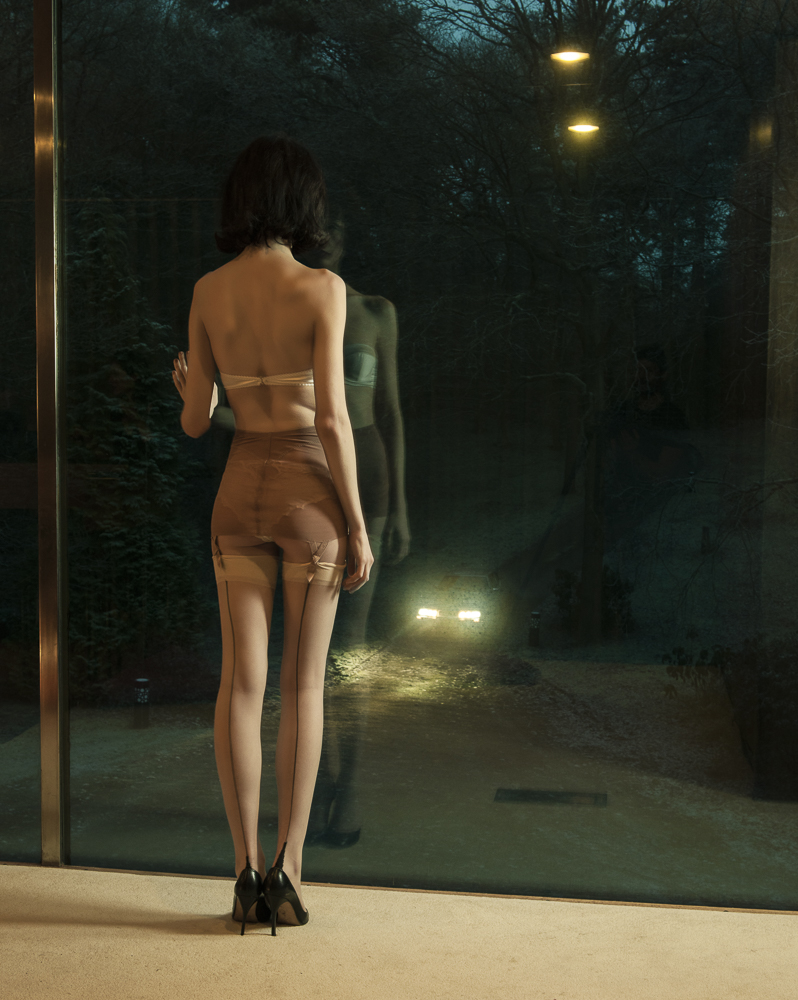
© Marc Rogoff www.marcrogoff.com
Q) What makes you get up on morning?
A) I guess the thing that gets me up every morning is the opportunity another day on earth presents me for discovering more about life, the universe and everything. I am lucky enough to be able to pursue a creative career that enables me to explore and learn and that is something that drives every minute of my day.
Q) What happened to your dreams as child?
A) I wanted to be a pilot like my grandfather and it was a shock to discover at the age of 16 when I was put in front of a career counselor at school that I did not have the qualifications to pursue this. In retrospect I am quite glad I didn’t as my life would have taken an entirely different turn.
Q) What did you give up?
A) If you are asking ‘me what I gave up in terms of my career – nothing. I transitioned my career to what I do today. If you are asking what I have given up in life then again I would say nothing. I don’t really give up – I am an extremely determined person so if it looks like I have given up something then rest assured it was done on my own terms.
Q) Where do you come from?
A) I was born in South Africa and went to boarding school in England from the age of 11.
Q) What is the first image you remember ?
A) It was a print of The Garden of Earthly Delights by Hieronymus Bosch (a depiction of heaven and hell) that was hung on a wall of our house in South Africa. I used to stare at it for hours… I still think it influences me today.
Q) And the first book ?
A) My first book I can remember reading was “The Magical Faraway Tree” by Enid Blyton, which was a book about a series of worlds that existed at different levels of a tree. This probably still influences me to day too!
Q) That is what distinguishes you from other artists?
A) Not sure I am able to answer that. I think each artist is an individual and if you put 10 photographers in a room together and asked them to photograph an object you would end up with 10 very different photos. My collective experiences inform everything I do subconsciously and I do have a very strange set of experiences to draw upon to make me different.
Q) Where do you work and how?
A) I work in the UK primarily and spend a lot of time on various locations for shoots.
Q) To whom do you never dare write ?
A) I can be pretty outspoken so if I feel that I need to write to someone I will do so if I feel that I am able to engage from an intellectual perspective.
Q) What music do you listen ?
A) I have extremely varied taste in music ranging from Rock through Ambient, to Indie as well as Classical.
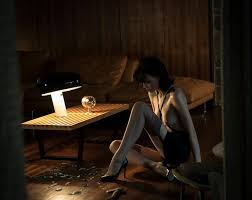
©Marc Rogoff www.marcrogoff.com
Q) What is the book you love read again?
A) “The Buddha in Daily Life” by Richard Causton
Q) When you look yourself in a mirror who do you see?
A) I am like a mirage. I can’t see myself clearly – I change from moment to moment. I think I reflect the basis of all reality in that way. Nothing is static and nothing lasts. I sometimes scare myself by looking into my own eyes too long!
Q) What city or place has value of myth for you?
A) I love the city of Capetown in South Africa. It is a city that has limited space to develop as it is stuck between Table Mountain and the ocean. It is the city that is most connected to nature that I have been to. It’s all around. You can smell the sea from an office block and get in a car and within 10 minutes be in the wilderness. I love that.
Q) What are the artists you feel closest?
A) I guess I feel closest to Edward Hopper. I feel that if I had pursued painting that he would have been the kind of artist I would like to have been. At the same time I love Dali for the depth of exploration of the mind.
Q) What film make you cry ?
A) Toy Story (no idea what that says about me?)
Q) What would you like to receive for your birthday?
A) An end to Rhino poaching in the world.
Q) What do you think of the sentence of Lacan: “Love is giving something that we don’t have to someone who does not want”?
A) I feel that that this is a rather depressing view of Love as this suggests that love is unattainable. I am a romantic so believe that love is taking a risk by giving the most intimate and personal part of yourself to someone and saying “Guard this well”….and hoping they do.
Q) And w. Allen: “The answer is Yes but what was the question?”
A) Would you go through this life again?
Q) What question I missed ?
A) Where do we go from here?
Marc Rogoff was interviewed by Jean-Paul Gavard-Perret, June 2016.
See more of Marc’s work at: www.marcrogoff.com
Stories of water : Muriel Bordier
— by Jean-Paul Gavard-Perret
Muriel Bordier, « Les thermes / leçons de natation », Autour des photographies de Muriel Bordier, MBE Paris, du 24 juin au 6 septembre 2016
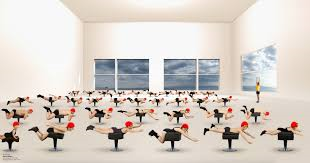 Muriel Bordier is an iconoclast. At the idea of Proust, ” the reality forms only in the memory,” she prefers the idea that the reality opens by the imagination. The photographer, by her directions, commits at the same time a funny and disturbing but not trivial metaphoric review.
Muriel Bordier is an iconoclast. At the idea of Proust, ” the reality forms only in the memory,” she prefers the idea that the reality opens by the imagination. The photographer, by her directions, commits at the same time a funny and disturbing but not trivial metaphoric review.
Sirens are more what than they were. The “baths” are modified by repetitions and ironic gaps. The absurd is there to propose a playful criticism of the world such as it is. The creator invents what Roland Barthes dreamed for the erotic photography.
According to him, the desire has inevitably an “object” but it is advisable to an artiste not to make it an object. It is necessary to transform it into fable as the swimmers are reduced in funny birds without feathers by which the desire for the liquid element is left otherwise tragic of the least vain.
Muriel Bordier, « Les thermes / leçons de natation », Autour des photographies de Muriel Bordier, MBE Paris, du 24 juin au 6 septembre 2016
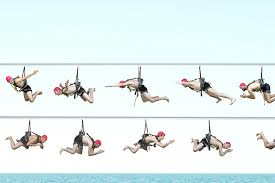 Muriel Bordier est une iconoclaste. A l’idée proustienne « la réalité ne se forme que dans la mémoire », elle réfère prouver que la réalité s’ouvre par l’imaginaire. La photographe par ses mises en scènes engage une relecture dans une histoire qui prend un caractère non anecdotique mais métaphorique à la fois drôle et inquiétant selon une osmose particulière entre le vide et le plein.
Muriel Bordier est une iconoclaste. A l’idée proustienne « la réalité ne se forme que dans la mémoire », elle réfère prouver que la réalité s’ouvre par l’imaginaire. La photographe par ses mises en scènes engage une relecture dans une histoire qui prend un caractère non anecdotique mais métaphorique à la fois drôle et inquiétant selon une osmose particulière entre le vide et le plein.
Elle corrode les habituels monstration du corps des sirènes. Le « bain » décante le réel, met à nu non seulement l’incarné mais la prison de l’être par répétitions et décalages ironiques. L’absurde est là afin de proposer une critique ludique du monde tel qu’il est. La créatrice invente ce dont Barthes rêvait pour la photographie érotique.
Selon lui le désir a nécessairement un objet mais il convient à un artiste de ne pas en faire un objet. Ou, comme c’est le cas ici de le métamorphoser en fable : il s’agit du dur désir de durer au moment où les nageurs sont réduits à de drôles d’oiseaux sans plumes dont l’appétence pour l’élément liquide demeure sinon tragique du moins vain.
About the interviewer:
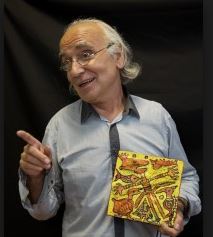 Jean-Paul Gavard-Perret contributes the On Location/France column to Ragazine.CC. You can read more about him in About Us.
Jean-Paul Gavard-Perret contributes the On Location/France column to Ragazine.CC. You can read more about him in About Us.
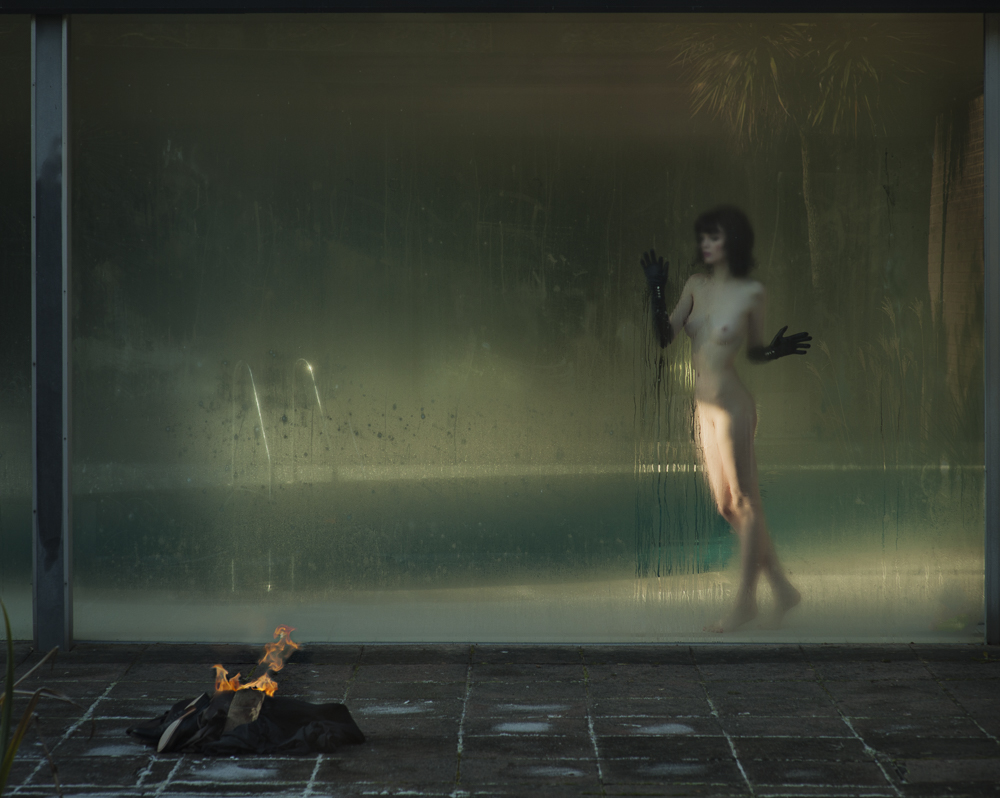
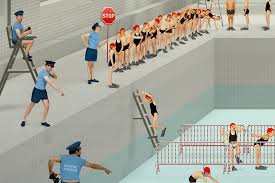
Recent Comments